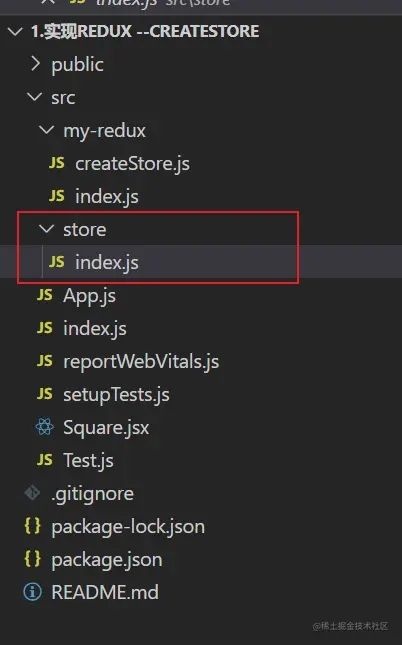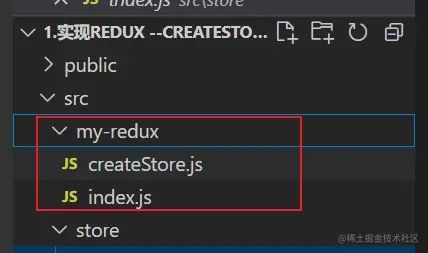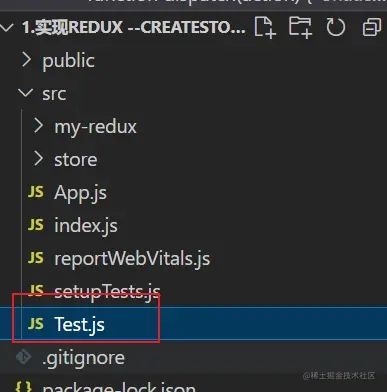1.首先创建一个store
沙箱链接
根目录创建一个store文件夹,下面创建一个index.js
import { createStore } from '../my-redux'
// 书写reducer函数
function reducer(state = 0, action) {
switch (action.type) {
case "add":
return state + 1;
case "inc":
return state - 1;
default:
return state;
}
}
// 使用createStore(reducer)创建store对象并且导出
const state = createStore(reducer);
export default state;
结合上面的代码分析
- 创建store是redux库的createStore函数接收一个reducer函数进行创建。
import { createStore } from '../my-redux'
- 先手写一个简单的reducer函数
// 书写reducer函数
状态值默认为0
function reducer(state = 0, action) {
switch (action.type) {
case "add":
return state + 1;
case "inc":
return state - 1;
default:
return state;
}
}
- 将创建的store导出
// 使用createStore(reducer)创建store对象并且导出 const state = createStore(reducer); export default state;
2.其次创建一个my-redux
- 将所有的函数都导入index.js
import createStore from './createStore'
export {
createStore
}
- 创建一个createStore.js
export default function createStore(reducer) {
let currentState; // 当前state值
let currentListeners = []; // store订阅要执行的函数储存数组
// 获得当前state值
function getState() {
return currentState;
}
// 更新state
function dispatch(action) {
// 传入action 调用reducer更新state值
currentState = reducer(currentState, action)
// 遍历调用订阅的函数
currentListeners.forEach((listener) => listener());
}
// 将订阅事件储存到currentListeners数组,并返回unsubscribe 函数来取消订阅
function subscribe(listener) {
currentListeners.push(listener);
// unsubscribe
return () => {
const index = currentListeners.indexOf(listener);
currentListeners.splice(index, 1);
};
}
dispatch({ type: "" }); // 自动dispatch一次,保证刚开始的currentState值等于state初始值
// 返回store对象
return {
getState,
dispatch,
subscribe,
}
}
可以根据上面给出的代码步步分析:
①明确createStore接收一个reducer函数作为参数。
②createStore函数返回的是一个store对象,store对象包含getState,dispatch,subscribe等方法。
- 逐步书写store上的方法
书写getState()方法
返回值:当前状态值
// 获得当前state值
function getState() {
return currentState;
}
书写dispatch方法
接受参数:action。
dispatch方法,做的事情就是:①调用reducer函数更新state。②调用store订阅的事件函数。
currentState是当前状态值,currentListeners是储存订阅事件函数的数组。
// 更新state
function dispatch(action) {
// 传入action 调用reducer更新state值
currentState = reducer(currentState, action)
// 遍历调用订阅的函数
currentListeners.forEach((listener) => listener());
}
书写subscribe方法
接受参数:一个函数 返回值:一个函数,用于取消订阅unsubscribe
// 将订阅事件储存到currentListeners数组,并返回unsubscribe 函数来取消订阅
function subscribe(listener) {
currentListeners.push(listener);
// unsubscribe
return () => {
const index = currentListeners.indexOf(listener);
currentListeners.splice(index, 1); // 删除函数
};
}
返回store对象
// 返回store对象
return {
getState,
dispatch,
subscribe,
}
特别注意:
初始进入createStore函数的时候,需要通过dipatch方法传入一个独一无二的action(reducer函数默认返回state)来获取初始的store赋值给currentStore。
可以结合下面reducer的default项和createStore方法调用的dispatch来理解
dispatch({ type: "" }); // 自动dispatch一次,保证刚开始的currentState值等于state初始值
// 书写reducer函数
function reducer(state = 0, action) {
switch (action.type) {
case "add":
return state + 1;
case "inc":
return state - 1;
default:
return state;
}
}
这样我们的createStore函数就已经完成了。那接下来就是检查我们写的这玩意是否起作用没有了。
3.创建一个Test组件进行检测。
老规矩先抛全部代码
import React, { Component } from 'react'
import store from './store' // 引入store对象
export default class Test extends Component {
// 组件挂载之后订阅forceUpdate函数,进行强制更新
componentDidMount() {
this.unsubscribe = store.subscribe(() => {
this.forceUpdate()
})
}
// 组件卸载后取消订阅
componentWillUnmount() {
this.unsubscribe()
}
// handleclick事件函数
add = () => {
store.dispatch({ type: 'add' });
console.log(store.getState());
}
inc = () => {
store.dispatch({ type: 'inc' });
console.log(store.getState());
}
render() {
return (
{/* 获取store状态值 */}
{store.getState()}
)
}
}
1. 将Test组件记得引入App根组件
import Test from './Test';
function App() {
return (
2. 将store引入Test组件
import React, { Component } from 'react'
import store from './store' // 引入store对象
3. 创建一个类组件,并且使用store.getState()获得状态值
{/* 获取store状态值 */}{store.getState()}
4. 书写对应的点击按钮
// handleclick事件函数
add = () => {
store.dispatch({ type: 'add' });
console.log(store.getState());
}
inc = () => {
store.dispatch({ type: 'inc' });
console.log(store.getState());
}
{/* 获取store状态值 */}
{store.getState()}
这样是不是就可以实现了呢?哈哈哈,傻瓜,你是不是猛点鼠标,数字还是0呢?
当然,这里我们只是更新了store,但是并没有更新组件,状态的改变可以导致组件更新,但是store又不是Test组件的状态。
这里我们使用一个生命周期函数componentDidMount和store的订阅函数进行更新组件的目的,使用componentWillUnmount和store的取消订阅函数(订阅函数的返回值)。
// 组件挂载之后订阅forceUpdate函数,进行强制更新
componentDidMount() {
this.unsubscribe = store.subscribe(() => {
this.forceUpdate()
})
}
// 组件卸载后取消订阅
componentWillUnmount() {
this.unsubscribe()
}
好了。这里我们就真实实现了一个简单的createStore函数来创建store。
以上就是简易的redux createStore手写实现示例的详细内容,更多关于手写redux createStore的资料请关注脚本之家其它相关文章!



